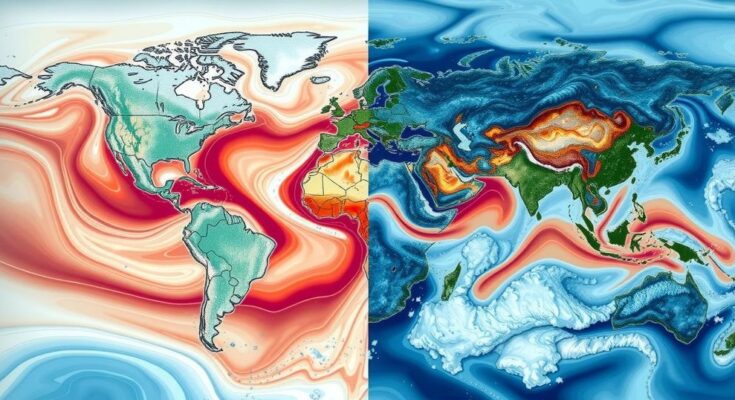The year 2025 has begun with significant weather events linked to human-caused climate change. Climate scientists assert that while not all weather variations can be directly tied to climate change, the increase in global temperatures is influencing many extreme weather occurrences. Recent advancements in climate science allow for better attribution of events like heat waves and hurricanes to climate change, highlighting the need for understanding how these trends affect our environment.
The year 2025 commenced with significant weather events, including fierce winds in Southern California leading to destructive wildfires, alongside major winter storms affecting the Mid-Atlantic and Southern regions of the United States. Amidst these occurrences, scientists from reputable meteorological organizations disclosed that 2024 had set a record as the hottest year documented in human history, primarily attributed to anthropogenic climate change.
Traditionally, climate scientists were hesitant to connect specific weather patterns to climate change; however, recent scientific advancements have enabled researchers to assess the influence of climate change on weather phenomena such as heat waves, hurricanes, and wildfires with greater precision. While not every meteorological variation can be closely linked to climate change, the continuous rise in global temperatures is increasingly observable in numerous extreme weather occurrences.
Justin Mankin, a climate scientist from Dartmouth College, remarked on the evolving climate trends, indicating that they are creating unprecedented weather scenarios. This brings attention to the distinction between climate and weather. Danielle Touma, a climate scientist at the University of Texas at Austin, eloquently stated, “The climate is basically the clothes you have in your closet,” indicating that while climate denotes the long-term trend, daily weather remains somewhat variable.
The scientific community traditionally quantifies climate by analyzing the 30-year averages of weather patterns. Even with the unpredictability of day-to-day weather, scientists anticipate that variation will continue amidst ongoing climate change impacts. The Earth’s temperature has risen approximately 1.3 degrees Celsius since the mid-19th century due to fossil fuel combustion, resulting in increased atmospheric heat retention.
This gradual temperature rise may not always lead to immediate, discernible changes in daily weather; however, its subtle influences are pervasive. Deepti Singh, a climate scientist at Washington State University, stated, “Everything we’re experiencing, it is occurring in a different environment,” indicating that the weather is subject to these gradual alterations.
Significantly, specific patterns such as reduced freezing days and an escalation in heat extremes have been noted across the United States. For instance, states like Michigan and Ohio report experiencing over a week fewer freezing days than in times prior to climate change, with the frequency of heat waves in the U.S. tripling since the 1960s.
The shifting climate also contributes to complex atmospheric and oceanic patterns, occasionally producing weather phenomena that diverge from historical norms. The severe heat wave in the Pacific Northwest in 2021 was closely linked to climate change, which both amplified temperatures and contributed to previously unseen atmospheric conditions.
To understand this dynamic interaction, scientists have developed methodologies termed
The connection between climate change and individual weather events has been a subject of increasing interest and research over the past decade. Initially, scientists were cautious about directly attributing specific weather patterns to climate change due to various complex variables at play. However, advancements in climate modeling and analytical techniques have enabled scientists to observe correlations and influences more accurately. Understanding the difference between climate (long-term averages) and weather (day-to-day conditions) is crucial for grasping contemporary discussions regarding climate change and global temperature shifts.
In conclusion, the interplay between human-caused climate change and extreme weather events is becoming increasingly evident. Recent advancements in scientific research have empowered experts to better identify and quantify the influence of climate change on various weather phenomena. It is important to recognize that while not every weather event can be traced back to climate change, the ongoing trends in global temperatures are altering the landscape of meteorological experiences, thus shaping our understanding of environmental conditions.
Original Source: www.upr.org




